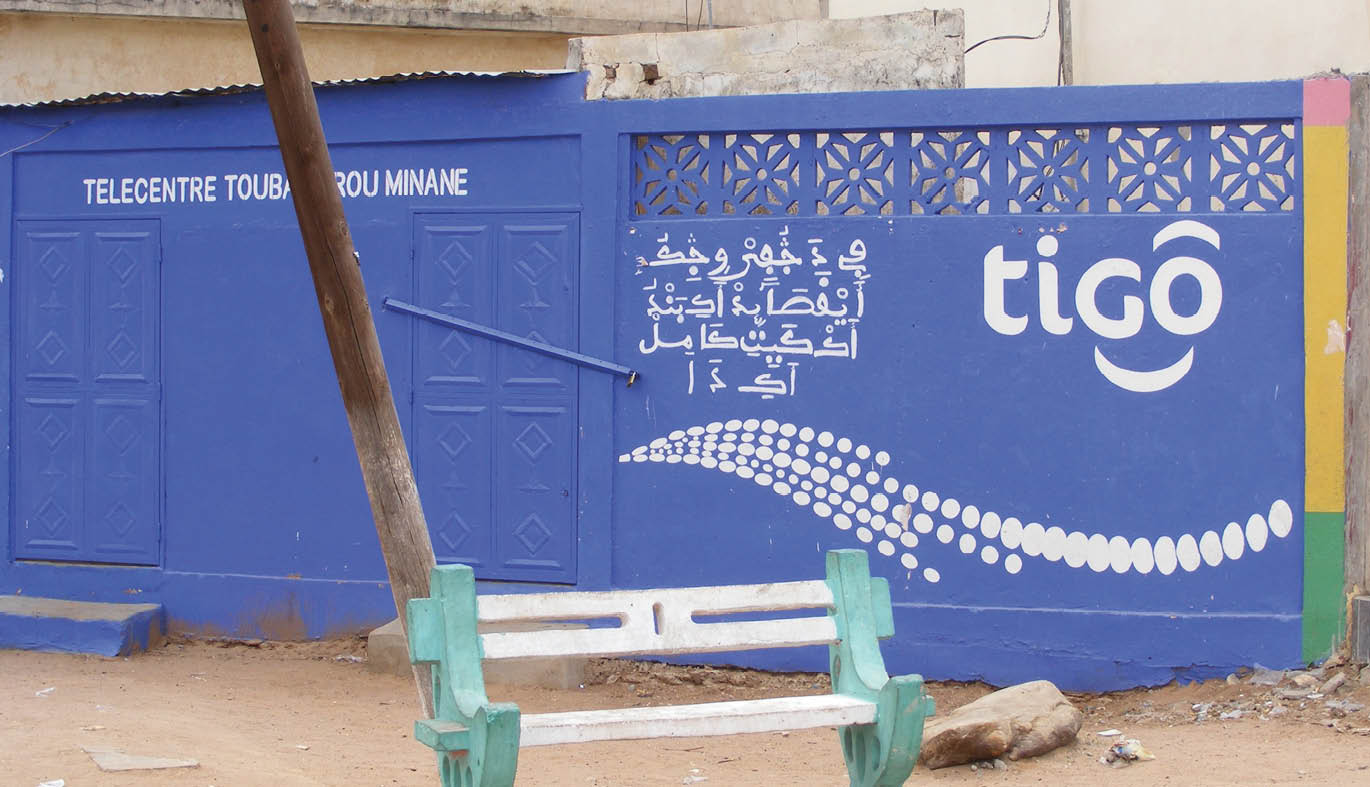Completing the Largest Digital Archive of Fuuta Jalon Scholars’ Arabic and Ajami Manuscripts
Our African Ajami scholars completed a landmark multi-year project, Digital Preservation of Fuuta Jalon Scholars’ Arabic and Ajami Materials in Senegal and Guinea, funded by the Endangered Archives Programme of the British Library. The project digitally preserved 49 collections of endangered Arabic and Ajami manuscripts (African-language texts written in an enriched form of the Arabic script), totaling 52,415 pages produced by Fuuta Jalon scholars who lived between the eighteenth and the twenty-first century in the Republic of Guinea and Senegal. The collections include original works of local scholars as well as handwritten copies made by their students, followers, and family members and maintained in private libraries across the Fuuta Jalon region of Guinea and Senegal, the home to the second largest Fuuta Jalon community in Africa. The resulting archive constitutes the largest digital collection of these materials in the world.
The project advanced scholarly knowledge of the rich bilingual corpus produced by Fuuta Jalon scholars. Such knowledge had long remained limited, due in part to Guinea’s isolation following its independence from France in 1958 and the absence of accessible public manuscript repositories. The preserved texts address a wide range of religious and secular themes in both prose and poetry. They explore theology, Qur’anic exegesis, praise of the Prophet Muhammad, Islamic law (especially the Maliki school), Sufism (including the Tijaniyya order), ritual practice, eschatology, and the lives of the prophets. Many texts include prayers, dream interpretation, talismanic formulas, and protective incantations for health, prosperity, and security.
Other works treat subjects such as logic, Arabic grammar, education, ethics, medicine, astrology, farming, and social relations, alongside school and family records. Historical texts recount the migration of the Fulani people to the highlands of Fuuta Jalon, the founding of their theocratic state (c. 1725–1896), their major battles and lineages, French colonial rule, and even the presidencies of Sékou Touré and Lansana Conté in the Republic of Guinea.

By making these materials accessible, the project laid a foundation for future research on the legacy of Fuuta Jalon in the New World. It also enabled scholars, students, and the broader public to better understand how enslaved Africans from the region, such as Abdu Rahman (1762–1829), had acquired advanced literacy skills prior to their enslavement in the Americas.
Although African Ajami literatures have remained largely unknown to the broader public, they have preserved a wealth of knowledge about the history and intellectual traditions of numerous African communities. Fula communities played a central role in the composition, teaching, and dissemination of Ajami in West Africa. Fula, the language of the Fulɓe people, developed across a vast region stretching from Senegal to Nigeria and Cameroon over the past millennium. Muslim scholars in these regions emerged as influential critics and reformers of Islamic practice in the Sahel and established several Islamic states during the eighteenth and nineteenth centuries. These states, particularly in Fuuta Jalon and Sokoto, stimulated the growth of rich traditions of Arabic and Ajami literacy and literature.
The project focused on preserving manuscripts central to these important legacies. Many manuscripts have been poorly preserved. Most showed visible signs of deterioration and were stored in old trunks, suitcases, or boxes, with some wrapped in animal hides. Kept in private homes in Senegal and Guinea, they had been exposed to risks such as water and fire damage, as well as termite and vermin attack.
The project preserved these primary sources and made them accessible to researchers, educators, students, and the broader public worldwide. Using on-site digital photography, the team digitized the materials directly within the communities where they were held. Field teams included local scholars and facilitators whose linguistic expertise and deep familiarity with local communities were essential to the project’s success. In identifying manuscripts for digitization, the teams worked closely with manuscript owners and community members. Local facilitators, often respected elders and recognized experts on Ajami texts, their authors, and collectors, played a key role in locating materials and establishing trust.
Team members consulted with owners and local specialists about the history, meaning, and use of each manuscript. These discussions provided critical historical and cultural context, supported accurate interpretation, and informed the development of detailed and reliable metadata for the collection.
Our African Ajami projects highlight the central role of local experts, scholars, community members, and facilitators in knowledge production. Through field interviews, the research teams gathered insights into the daily practices of Ajami users, as well as their educational and professional backgrounds and their histories of learning and using Ajami. This work generated valuable information about the contemporary role of Ajami in West African communities, shedding light on the meaning and purpose of the texts studied and amplifying the voices of those who had written, collected, preserved, and used them.
In addition to the completed preservation project, we carried out several other major African Ajami research initiatives. Ajami Literacy and the Expansion of Literacy and Islam: The Case of West Africa, funded by the National Endowment for the Humanities, undertook a comparative study of Ajami manuscripts in four major West African languages: Hausa, Mandinka, Fula, and Wolof. Our international team digitized the manuscripts, transcribed and translated them into English and French, prepared scholarly commentaries, and developed multimedia resources. This project marked the first time such a diverse body of African Ajami texts had been translated into two major European languages and made globally accessible. Another major initiative was Readers in Ajami, funded by the United States Department of Education, through which we developed specialized Ajami readers in Hausa, Wolof, and Mandinka, along with a companion multimedia website. The project provides students, teachers, scholars, and professionals with the linguistic and cultural tools needed to engage Ajami users in West Africa.
Drawing on this collective work, we published a double special issue of Islamic Africa (vol. 14/ 2, 2023; vol. 15/1, 2024), which examined Ajami literatures and literacies in West Africa and situated African Ajami studies within participatory multimedia and digital archiving approaches.
The core team of the EAP-1430 project consisted of Prof. Fallou Ngom (PI), Dr. Daivi Rodima-Taylor (Project Manager), Mr. Ablaye Diakite (Local Team Leader), Mr. Mouhamadou Diallo (General Coordinator), Mr. Oumar Diallo (Regional Facilitator), Mr. Ibrahima Ngom (Cameraman), and Mr. Mamadou Billo Sall aka Bappa Sall (Senior Facilitator). We acknowledge the support of the Provost's Office and the Associate Dean of the Faculty of Social Sciences, as well as the technical support of Brian Anderson of CAS IT who did the checksum tests of the collections. We also wish to honor the memories of Mr. Elhadji Djibril Diagne and Mr. Abdoulaye Diallo, whose contributions to our Ajami projects have been invaluable and whose presence is deeply missed. We are profoundly grateful to all our collaborators and the communities we worked with in West Africa.
Presentation on African Ajami at the BU Digital Ventures Open House
Fallou Ngom and Daivi Rodima-Taylor presented at the Boston University Digital Ventures Open House on African Ajami projects. The event took place on March 31, 2025, and brought together researchers, students, and various staff members of the Boston University Libraries to discuss their work around digital scholarship and archival collections. The gathering provided a dynamic space for participants to share insights, highlight ongoing projects, and explore innovative approaches to preserving and making archival materials more accessible. The BU Libraries’ Digital Ventures provides digitization and digital scholarship services that support the global reach of scholarship produced at BU, and provides support with archival resources, digitization, and digital project consultation.
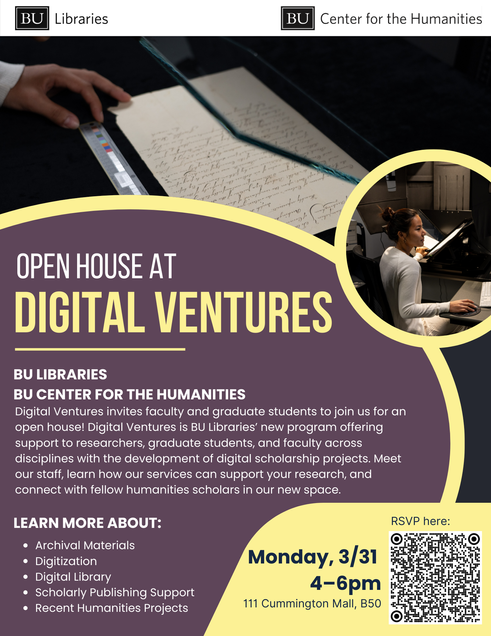
Ajami Readers in Wolof, Mandinka, and Hausa
The Boston University Readers in Ajami (RIA) project has developed three African Ajami Readers – of over 600 pages of instructional materials. The Wolof, Mandinka, and Hausa Ajami Readers offer a comprehensive multimedia learning experience in combination with the interactive project website.
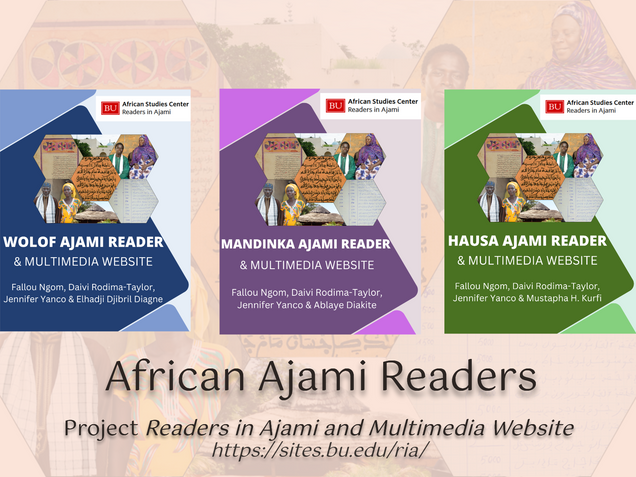
The initiative aims to revive and promote African literatures written in Ajami, which refers to the use of Arabic script for non-Arabic languages. These resources help uncover the wealth of cultural, historical, and political knowledge embedded in Ajami texts, which for centuries have been a key medium of literacy in many African societies. Ajami writing, which has remained largely obscure to many due to limited access to its texts, serves as an important tool for grassroots education and communication.
The Ajami Readers and the multimedia website provide a comprehensive learning experience. They contain digitized texts, photo images, video interviews, and interactive exercises in Wolof, Mandinka, and Hausa Ajami, accompanied by Latin-script transcriptions and English translations. The Ajami Readers are authored by Fallou Ngom, Daivi Rodima-Taylor, Jennifer Yanco, Elhadji Diagne, Mustapha Kurfi, and Ablaye Diakite, with the assistance of numerous people including Ousmane Cisse, Gana Ndiaye, and Bala Saho. The Geddes Language Center digital humanities team, Alison Parker, Frank Antonelli, Shawn Provencal, and Mark Lewis, provided help with the multimedia website.
Funded by a grant from the U.S. Department of Education, the project provides a template for future resources in other African languages, offering a bridge between traditional local knowledge and modern educational tools.
More about our Ajami activities can be found in our recent news article.
SEE RELATED CONTENT
Chefs et Marabouts: David Robinson’s Work Translated for Francophone Audiences
Professor David Robinson's book, Chiefs and Clerics: Abdul Bokar Kan and Futa Toro, 1853-1891 in the Senegal Valley, has been translated into French under the title Chefs et Marabouts - Abdoul Bocar Kan et le Fouta Toro. 1853 - 1891. The French edition was published by Éditions Jimsaan, a Senegalese publishing house.
The book explores the history of Futa Toro in the 19th century, focusing on Abdoul Bokar Kan, a visionary leader who resisted French colonial ambitions to maintain his people's autonomy. It examines the dynamics between local chiefs and Islamic clerics during a period marked by the expansion of French colonial influence in West Africa.
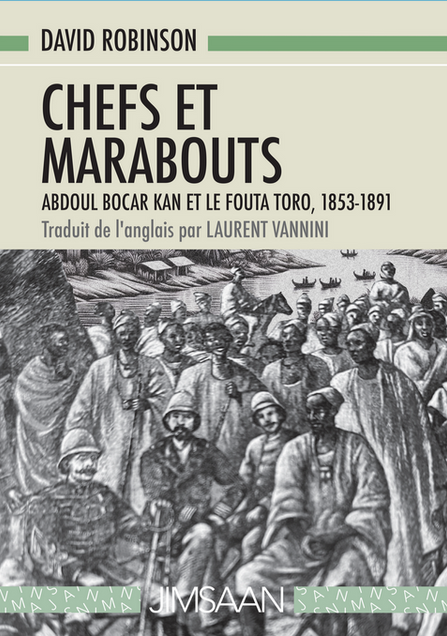
The French edition will be launched on January 4, 2025, at Librairie L'Harmattan in Dakar, Senegal. The event features a roundtable discussion with historian Ibrahim Thioub, author David Robinson (participating via videoconference), family representative Abdoul Aly Bocar Kane, and editor Felwine Sarr: https://www.editionsjimsaan.com
This translation makes Professor Robinson's significant work more accessible to French-speaking audiences, offering valuable insights into the historical interactions between African leaders and colonial powers in the Senegal Valley.
David Robinson is a distinguished historian whose work has profoundly shaped the study of African history, particularly in the areas of Islamic societies, colonial encounters, and resistance movements in West Africa. His research illuminates the complex dynamics between African leaders and European colonial powers, especially in Senegal and Mauritania, showcasing how local actors negotiated, resisted, and adapted to colonial rule. Robinson combines oral histories, colonial archives, and Islamic manuscripts, pioneering interdisciplinary approaches that bridge African and Islamic studies. His works, such as Muslim Societies in African History, are widely used in academic curricula, fostering a deeper understanding of Africa’s diverse histories and cultures. David Robinson’s research has been pivotal in challenging Eurocentric narratives, emphasizing African agency, and highlighting the rich interplay between local and global historical forces.
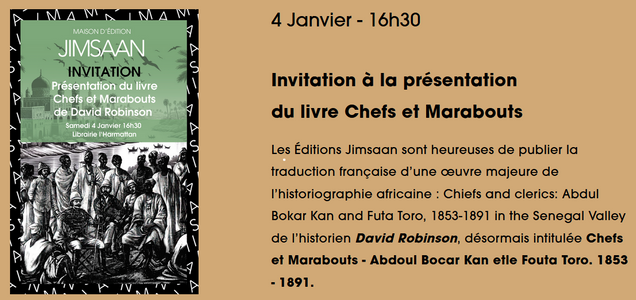
New Ajami Readers and Multimedia Tools
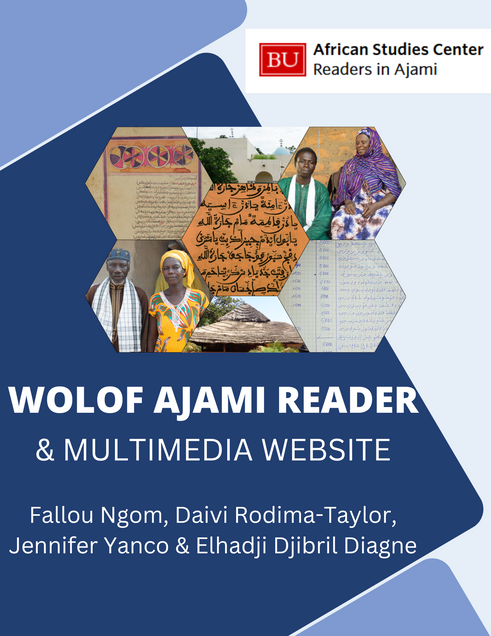 Our Readers in Ajami project has developed important learning resources in African Ajami, featuring a multimedia interactive website and the 200-page Wolof Ajami Reader, the first in a series of three planned Ajami Readers. The project is conducted with a grant from the U.S. Department of Education. These resources aim to bring greater visibility to African literatures written in Ajami, addressing the historical gap in access to this wealth of knowledge about Africa’s history, politics, and cultural traditions.
Our Readers in Ajami project has developed important learning resources in African Ajami, featuring a multimedia interactive website and the 200-page Wolof Ajami Reader, the first in a series of three planned Ajami Readers. The project is conducted with a grant from the U.S. Department of Education. These resources aim to bring greater visibility to African literatures written in Ajami, addressing the historical gap in access to this wealth of knowledge about Africa’s history, politics, and cultural traditions.
Our specialized Ajami Readers—covering Wolof, Mandinka, and Hausa, three major African languages with rich Ajami traditions—are designed to equip students, teachers, scholars, and professionals with the skills necessary to engage with the Ajami literary traditions of West Africa. These resources offer an in-depth look into a wide range of fields, including business, health, agriculture, human rights, and politics, making them especially valuable for understanding the increasingly influential Muslim societies of the Sahel region.
The Wolof Ajami Reader is authored by Fallou Ngom, Daivi Rodima-Taylor, Jennifer Yanco, and Elhadji Djibril Diagne. It is developed from manuscripts and interviews collected in Senegal and focuses on promoting literacy, oral proficiency, and cultural knowledge. The Reader contains six thematic units with biographical information and images of the authors or discussants of the manuscripts, the texts in Wolof Ajami with Latin-script transcriptions and English translations, images of Ajami user communities, glossaries and notes, and pedagogical exercises.
The Reader Units are complemented by their corresponding Wolof Ajami video interviews on the project website, containing video clips with Latin-script and English subtitles, metadata with information about the videos and contributors, Ajami user-community images with Latin-script and English captions, glossaries and notes, and pedagogical exercises. This multimedia resource gives the users access to interactive tools such as an embedded Wolof Ajami keyboard for practice.
The Reader also serves as a template for creating similar resources in other African languages that utilize Ajami scripts, bridging the gap between local writing traditions and the widely-used Latin script. It provides a model for building sustainable digital educational materials that incorporate the overlooked yet invaluable local knowledge contained in Ajami documents.
You can find more updates on our African Ajami projects in our recent news article on the BU African Studies Center website.
See related content
Our “Readers in Ajami” project featured at the International Research and Studies Program meeting
Our staff members attended the Project Directors Meeting of the International Research and Studies Program of the United States Department of Education that took place on April 12, 2024, in Washington, DC. Prof. Fallou Ngom and Dr. Daivi Rodima-Taylor presented on our ongoing project, Project RIA: Readers in Ajami and Companion Multimedia Website.
The project is conducted with a three-year grant by the U.S. Department of Education to develop specialized Ajami readers in Wolof, Mandinka, and Hausa (three major African languages with rich written Ajami literatures) with a multimedia companion website. It aims to provide students, language teachers, scholars, and professionals with the necessary linguistic, cultural, and literacy skills to engage with Ajami users of West Africa. The instructional resources of the project cover a range of fields, including business and economy, health and medicine, agriculture and the environment, and human rights, politics and diplomacy.
Ajami is the term used to refer to non-Arabic languages and literatures that are written with the enriched form of the Arabic script. African Ajami literatures hold a wealth of knowledge about history, politics, and cultural and intellectual traditions of the region, but are generally unknown due to lack of access. The history of Ajami refutes the claims that Africa lacks written traditions. The RIA project builds on the Ajami manuscipts, texts, and records digitized by the project members during the fieldwork in the communities of Senegal, Nigeria, and the Republic of Guinea, and the video interviews and digital images recorded in the local Ajami user communities. It pursues participatory knowledge-making through ethnographic interviews, conversations with chanters and singers of poems and treatises, and collaborating with local experts in transcribing and translating Ajami manuscripts. Through field interviews, our research teams sought insights into the daily practices of Ajami users and their history of learning and using Ajami. This provided significant information about the present-day role of Ajami in the communities of West Africa.
The project develops instructional materials that include texts in Wolof, Mandinka, and Hausa Ajami, their Latin-script transcriptions and English translations, cultural notes and glossaries, pedagogical exercises, and multimedia materials that will be made available on the project website. The instructional methodology that the project produces can be replicated for other world languages with dual literacy systems (such as Ajami and Latin script orthographies). Our team, led by Professor Ngom, includes Dr. Daivi Rodima-Taylor, Dr. Jennifer Yanco, Dr. Mustapha Kurfi, Mr. Ablaye Diakite, Mr. Elhadji Diagne, Dr. Bala Saho, and the Geddes Language Center digital specialists Alison Parker, Shawn Provencal, and Frank Antonelli. The project will provide an optimal model of how to build and sustain specialized textual and digital educational resources that incorporate local voices and knowledge recorded in African Ajami scripts – something many academics and professionals have overlooked for centuries.
The International Research and Studies Program supports research, studies, and the development of instructional materials to strengthen instruction in modern foreign languages, area studies, and other international fields. The all-day workshop provided the program grantees with an opportunity to share experiences about ongoing projects and network with other grantees and the staff of the International and Foreign Language Education Office.
Our presentation was also featured in the International Foreign Language and Education June newsletter.
Our recent African Ajami research projects include Ajami Literature and the Expansion of Literacy and Islam: The Case of West Africa (with a National Endowment for the Humanities Collaborative Research Grant), and Digital Preservation of Fuuta Jalon Scholars’ Materials in Senegal and Guinea (with a research grant from the Endangered Archives Programme of the British Library). Our scholars recently published a double special issue in Islamic Africa (volumes 14/2, 2023 and 15/1, 2024).
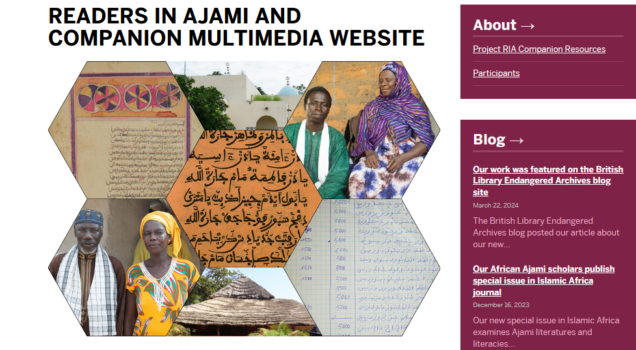
Our work was featured on the British Library Endangered Archives blog site
The British Library Endangered Archives blog posted our article about our new project, Digital Preservation of Fuuta Jalon Scholars’ Arabic and Ajami Materials in Senegal and Guinea. The project is funded by a grant from the Endangered Archives Programme (EAP1430). It seeks to digitally preserve 50,000 pages of endangered Arabic and Ajami manuscripts (texts written with modified Arabic script) produced by Fuuta Jalon scholars who lived between the 18th and early 20th centuries in what is now the Republic of Guinea. The endangered Arabic and Ajami manuscripts to be preserved and digitized include the surviving texts of important scholars and the handwritten copies made by their students, followers and family members who have kept them in their private libraries in the Fuuta Jalon region in Guinea and Senegal where the second largest Fuuta Jalon community in Africa lives. These archives will be the largest digital records of this material in the world.
NEH Ajami project members publish Special Issue in “Islamic Africa”
Our new special issue in Islamic Africa examines Ajami literatures and literacies in West Africa and situates African Ajami studies in participatory multimedia and digital archiving approaches. The double special issue of nine articles is titled “Ajami Literacies of Africa: the Wolof, Mandinka, Hausa and Fula Traditions” and is co-edited by Fallou Ngom, Daivi Rodima-Taylor, David Robinson, and Rebecca Shereikis (Islamic Africa, volumes 14, issue 2, 2023 and 15, issue 1, 2024). It centers around the knowledge generated through the African Ajami research project funded by the National Endowment for the Humanities.
African Ajami literatures hold a wealth of knowledge on the history and intellectual traditions of the region but are largely unknown to the larger public. The history of Ajami refutes the claims that Africa lacks written traditions. The downplaying and devaluing of the significance of African Ajami traditions has long characterized Arab-centric and Eurocentric scholars and administrators of the colonial era, and its legacy persists, perpetuating racial stereotypes, and limiting political and educational participation.
The articles of the special issue make three main contributions. First, they establish important historical dimensions of the role of Ajami literacy in mediating the lives of grassroots communities that have not yet been systematically studied. Secondly, they enable unique comparative perspectives on Ajami use in four major West African languages, contributing to the interpretive and contextual analysis of Ajami literacies and their social role. The special issue articles draw on the materials in our African Ajami collections, analyzing various manuscripts and topics and situating them socially and temporally in their communities of origin. And thirdly, the articles explore the role of digital technologies and methods in studying and preserving African Ajami texts.
The introductory article to the special issue by Fallou Ngom, Daivi Rodima-Taylor, and David Robinson discusses the building blocks and historical development of Ajami cultures in West Africa, outlines the collaborative research initiatives that our special issue draws upon, and explores the challenges and opportunities for participatory knowledge-making that accompany the rise of digital technologies in the study of African literatures and literacies.
Special issue contributors include Bala Saho, Ousmane Cisse, Margaret Rowley, Elhadji Diagne, Gana Ndiaye, Mustapha Kurfi, Jennifer Yanco, David Glovsky, Abubakar Jalloh, Karen Barton, Eleni Castro, Neil Patel, and Mark Jamra.
Our other ongoing African Ajami research initiatives include the Readers in Ajami project and Digital Preservation of Fuuta Jalon project.
Read the BU Pardee School of Global Studies news article about the special issue here.
Our work was also featured in Brill blog Humanities Matter.
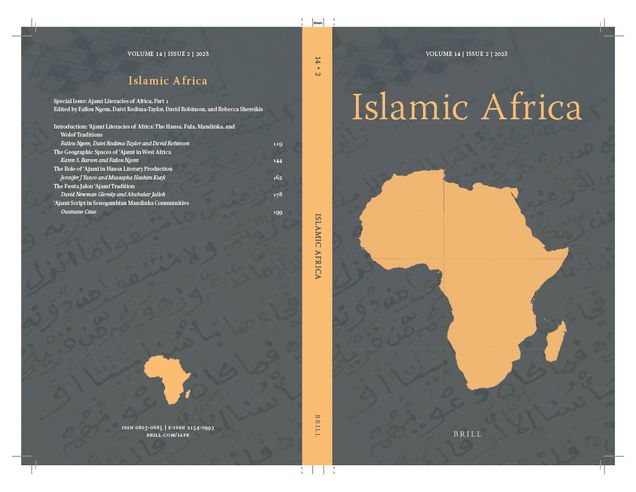
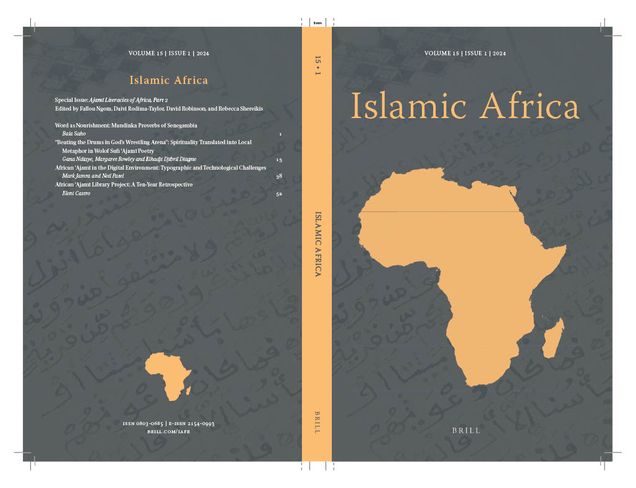
Our Ajami research is featured in BU research journal The Brink
BU research journal The Brink published a new feature article on our Ajami research on December 21, 2022. Read more here
New Research Grant for African Ajami Studies from the British Library
The Boston University Ajami Studies team received a new research grant from the Endangered Archives Programme of the British Library (EAP 1430), for a project “Digital Preservation of Fuuta Jalon Scholars’ Arabic and Ajami Materials in Senegal and Guinea.” The project that will commence in Spring 2023 will digitally preserve 50,000 pages of endangered Arabic and Ajami manuscripts (texts written with the modified Arabic script) produced by Fuuta Jalon scholars who lived between the 18th and early 20th century in the Republic of Guinea. The 50,000 pages of the endangered Arabic and Ajami manuscripts to be preserved in this project will include surviving texts of important scholars and handwritten copies made by their students, followers, and family members who keep them in their private libraries in the Fuuta Jalon region in Guinea and Senegal where the second largest Fuuta Jalon community in Africa lives. The archives to be preserved in this project will be the largest digital records of such materials in the world.
The project aims to advance existing scholarly knowledge about the rich bilingual works of Fuuta Jalon scholars. That knowledge is still very scarce, partly due to their country’s isolation after its independence from France in 1958, and the lack of public repositories of manuscripts. The texts deal with diverse topics such as astrology, divination, talismanic devices, Sufism, theology, panegyrics of Prophet Muhammad, Quranic exegesis, didactic materials in prose and poetry, elegies, grammar, philology, jurisprudence, calendars, history, biographies, genealogies, legends, commercial records, records of important events, diplomatic correspondences, pastoral poems on nature and rural life, and French colonization and its legacies. These materials could lay a foundation for future works on the legacy of Fuuta Jalon in the New World, and enable scholars, students, and the public to understand better how some enslaved Africans were educated and acquired Arabic and Ajami literacy skills before their captivity in the Americas.
